If you’ve worked in any industry or sector long enough, you start to see some patterns.
I have been working in the base of the pyramid (BoP) domain since 1989. During that time, I have been fortunate to engage with many entrepreneurs and business leaders seeking to develop and launch enterprises in BoP markets. When I first meet these entrepreneurs, they are excited and passionate about their potential impact. 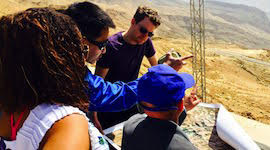 They have a product or service and a proposed business model. Often they have won some sort of business competition or have some internal corporate seed funding. They are on their way, with the next big milestone being additional capital.
They have a product or service and a proposed business model. Often they have won some sort of business competition or have some internal corporate seed funding. They are on their way, with the next big milestone being additional capital.
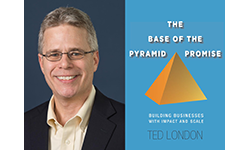
WDI Senior Research Fellow Ted London will be the featured guest for a May 17 webinar organized by Business Call to Action (BCtA) and the Practitioner Hub on Inclusive Business. Click here to register for the free webinar, which begins at 9 a.m. Eastern U.S.
London, who also leads the Institute’s Scaling Impact Initiative, will discuss his recently-released book, “The Base of the Pyramid Promise: Building Businesses with Impact and Scale.”
The webinar will be hosted Caroline Ashley, director of Ashley Insight and editor of Practitioner Hub. It will feature an interactive Q&A with the audience.
For more information:
Kerry Shields worked in the healthcare industry before coming to U-M’s Ross School of Business for her MBA and has plans to return to it after graduation. So she was eager to find a MAP (Multidisciplinary Action Project) in a different industry, and was ecstatic when she learned she was part of the WDI-sponsored MBA student team working with the Relationship Coffee Institute and Sustainable Harvest in Rwanda.
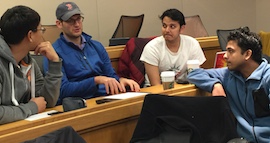
The Relationship Coffee Institute (RCI) is a nonprofit, public benefit corporation – or, B Corp – working to increase social and economic opportunity for smallholder commodity farmers and their families. Its partner, Sustainable Harvest, is one of the largest importers of fair trade specialty coffee in the U.S.
“What this company is trying to do is important and innovative and I can learn from that,” she said. “Hopefully we will have had an impact at the end of the project and get a better understanding how a private company can help alleviate poverty.”
The MAP in Rwanda is one of eight student projects organized and sponsored by WDI. MAP is an action-based learning course offered at Ross for MBA students who receive guidance from their faculty advisors. Each project requires analytical rigor, critical thinking, and teamwork. Sponsors receive top-notch deliverables and data-driven recommendations from the team of students.
After learning about their projects and conducting research in the classroom for several weeks, the students then spend three to four weeks working alongside their project sponsors in the field.
Sylvia Jimenez will work on a WDI-sponsored MAP team for CARE, a non-profit organization seeking to use business approaches to address social issues.
“I’m looking forward to getting out of my comfort zone and doing something different than I have done before,” she said. “I think I’ll learn a lot about me as a team player, and learn about my teammates and what their strengths are.”
Ted London, vice president of WDI’s Scaling Impact Initiative, is one of the faculty advisors on the Sustainable Harvest and CARE MAPs as well as two others. Before the teams traveled to their destinations for on-the-ground work, he brought them together for a special WDI-focused session to get to know each other better before they left and to touch on some of the key issues the teams will face in the field.
He discussed what it takes to conduct good interviews, particularly in a base of the pyramid (BoP) market context, emphasizing that the goal of these interviews is to develop data-driven recommendations. Among other things, he also told the students to approach people they meet and interview with respect and humility to maximize the depth and quality of the data collected during the interview.
“You are not only there as expert problem-solvers, but also as experts in learning and listening,” he said. “Only by collaborating and co-creating can we build solutions that really work.”
London said his MAP projects allow students to take what they learned in the classroom and apply it in a BoP context.
“For students interested in working in this space as a career, it is an amazing opportunity,” he said. “These MAPs open students’ eyes to this part of the world and to this scale of enterprise and impact. They’re part of the minority seeing how the majority of the world conducts business.”
WDI and its partners get value from the experience as well, London said. Seven of the eight MAP projects are with partners that have long-term relationships with WDI.
“By leveraging MAP and the great skills of the Ross students, we’re providing resources and expertise to our partners to help them solve the problems they’re facing,” London said. “And it’s a way for us to collaborate with partners in the field, apply our knowledge, and learn what are the next-generation tools we need to think about in the future.”
Here is a summary of each MAP project:
Aravind Eye Care System – India
Advised By: Paul Clyde, WDI and Ross School of Business; Peter Lenk, Ross School of Business
MAP Team: Jackie Barnum, Katie Redman, Alex Kravitz, Matt Tafoya
Aravind Eye Care System (AECS) has five tertiary care centers, six secondary care centers, six community clinics, and 54 primary eye care centers across the Tamil Nadu state in India. Now AECS is expanding, opening tertiary hospitals in Chennai and Tirupathi in the next couple of years, and there are also plans to expand the services/facilities in the existing hospital units.
The student team will customize and test at two to three AECS facilities an existing process model that will measure performance of each unit and is understandable to everyone in the organization.
Cooperative for Assistance and Relief Everywhere (CARE) – India
Advised By: Ted London, WDI and Ross School of Business; Jane Dutton, Ross School of Business
MAP Team: Karina Cabanillas, David Chang, Takashi Takizawa, Sylvia Jimenez
CARE has been working in India for over 65 years, focusing on ending poverty and social injustice. Its overall goal is the empowerment of women and girls from poor and marginalized communities leading to improvement in their lives and livelihoods.
Most smallholder farmers, a vast majority of whom are women, have limited access to quality and affordable agriculture input, services, finance and technologies. The student team will develop a profitable and socially inclusive business plan that CARE can execute in 2016 that facilitates access for smallholder farmers to inputs and related services. This should be a commercially viable and financially sustainable approach that avoids donor dependency through the development of an agricultural input supply social enterprise in India.
Sustainable Harvest & Relationship Coffee Institute – United States
Advised By: Ted London, WDI and Ross School of Business; Ravi Anupindi, WDI and Ross School of Business
MAP Team: Stacey Nathan, Whitney Augustine, Erdem Eray, Grant Cowherd
Sustainable Harvest of Portland, Ore. is an importer of high quality, specialty grade coffees from smallholder farmers from 15 countries around the world. In 2012, Sustainable Harvest formed a nonprofit organization, the Relationship Coffee Institute (RCI), to help propagate its business model and advance farmer training. In fall 2015, in conjunction with RCI and 4,000 women farmers in Rwanda, Sustainable Harvest launched Question Coffee, which represents its fundamental goal to empower coffee farmers and foster sustainable supply chains. It is Sustainable Harvest’s first B Corp certified product throughout the entire value chain, meaning it’s a for-profit entity that includes positive impacts on society, workers, and the environment. Net proceeds from Question Coffee go to farmer training, which contributes to better quality, improved yields and increased income and wellbeing for coffee farmers at the base of the pyramid.
The student team will conduct research to identify Question Coffee’s value proposition to consumers, resulting in several specific, actionable recommendations on branding and marketing strategies. The team also will devise several recommendations and strategies for greater market penetration.
Relationship Coffee Institute (in partnership with Sustainable Harvest) – Rwanda
Advised By: Ted London, WDI and the Ross School of Business; Jane Dutton, Ross School of Business
MAP Team: Courtney Landy, Aaron Whallon, Juan Marino, Kerry Shields
For this project, the student team will test and evaluate the value of B Corp certification to see if it could improve the lives of smallholder farmers in Rwanda, and how it could be scaled or applied to other commodities.
Zemen Bank – Ethiopia
Advised By: Paul Clyde, WDI and Ross School of Business; Bob Dittmar, Ross School of Business
MAP Team: Dana Yerace, Max Jacobson, Florence Noel, Nicholas Mencher
Zemen is a commercial bank located in Addis Ababa, Ethiopia. Its vision is to bring new dynamism to the financial sector and the banking business in Ethiopia. It is interested in serving small- and medium-sized enterprises (SMEs). Using a banking scheme in which Ethiopians living in the U.S. could put a hold on some monetary amount in their bank account, Zemen would then access the account for a low interest loan for Ethiopian citizens starting or expanding a small business. The hold on the U.S. bank would be reduced as the loan is paid back.
The student team will develop the business case for diaspora SME loans and assess the prospects for scaling the program to a level that would interest Zemen Bank. If the scheme were deemed viable, then the team would formulate a plan for executing the program.
Imperial Health Sciences (IHS) – South Africa
Advised By: Paul Clyde, WDI and Ross School of Business; Ravi Anupindi, WDI and Ross School of Business
MAP Team: Amit Patel, Jennifer Paxton, Anuja Mehta, Aric Adams
IHS provides supply chain solutions to the public and private pharmaceutical markets in Africa. IHS and the Imperial Logistics group have adopted the Unjani project as its Corporate Social Responsibility project. Unjani aims to establish a network of nurse-owned franchise clinics in historically underserved communities across South Africa. It has 19 operating clinics with plans to add 25 more by May. The group will take over an independent, failing clinic.
The student team will assess the change in the failing clinic’s success level after instituting the processes, controls, training, and marketing of the Unjani franchise network. Examining the operational and environmental factors of the clinic, along with some financial analysis, will allow IHS to better understand why this clinic failed. That will help IHS further develop the Unjani concept and ensure successful clinics in the future.
ITC Ltd. – India
Advised By: Ted London, WDI and Ross School of Business; Venkatram Ramaswany, Ross School of Business
MAP Team: Nishant Agrawal, Kee Cho, Arun Prakash, Dave Teebagy
ITC is a major diversified Indian conglomerate. ITC’s e-Choupal initiative is enabling Indian agriculture to enhance its competitiveness by empowering Indian farmers through the power of the Internet. The initiative facilitates the two-way flow of goods and services in and out of villages, and describes itself as the largest Internet-based intervention in rural India by a corporate entity.
The student team will help ITC design the next version of e-Choupal. The team will deliver a report exploring how the first three versions of e-Choupal have created value and where further opportunities for value creation may exist. The team also will look into how other models of rural farmer engagement are being deployed in other developing countries, identify the various stakeholders impacted, and highlight how the proposed model creates value for them.
Aparajitha Foundation – India
Advised By: Paul Clyde, WDI and Ross School of Business; Jim Walsh, Ross School of Business
MAP Team: Jamyle Michael, Holly Price, Aaron Steiner, Meghan Sheehan
The Aparajitha Foundation is an arm of the Aparajitha Group. It is committed to the cause of creating transformational change in adolescents by using audiovisual technology to deliver life skills training to economically disadvantaged children in India’s Tamil Nadu state.
The MAP team will develop a complete business plan for entrepreneurship education, training and development. The model should be scalable so that it can be used across the country in the future.
WDI’s Scaling Impact Initiative is working with Walmart to chronicle what the retail giant has learned from its efforts to include small producers in global supply chains.
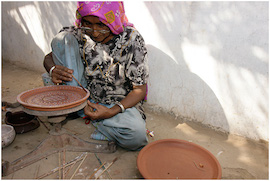
The successes, challenges, and lessons learned will become a policy brief and a teaching case, both written by WDI in collaboration with Professor Linda Scott of Oxford University’s Said Business School. Both documents will be published this spring, and are geared toward Walmart and other retailers looking to develop more effective sourcing programs in the future.
WDI Vice President of Scaling Impact Ted London and Research Manager Colm Fay, along with Scott, are studying two Walmart programs.
One is Empowering Women Together, which sources handicrafts from women-owned base of the pyramid businesses in East Africa, Nepal, India and other emerging markets to sell online. The other is Direct Farm, which buys fresh fruits and vegetables from small- and medium-sized farmers to supply Walmart’s stores in Central and South America, Mexico, South Africa, and India.
The team has interviewed managers from Walmart, the Walmart Foundation, and their implementing partners.
This is the second collaboration between WDI and Walmart. Last year, WDI Publishing released a case study on the evolution of a global cross-sector partnership between Walmart and the United States Agency for International Development (USAID). The case looked at what had been gleaned – both positive and negative – during the 15-year collaboration between the two organizations.
The free case, “Walmart and USAID: The Evolution of a Global Cross-Sector Partnership,” focused on partnerships that sought to engage smallholder farmers in the developing world, and highlighted examples from Honduras, Guatemala, Rwanda and Bangladesh. It explored the ways in which these collaborations came about, how they were supported by the partners, and the level of success achieved as measured by Walmart, the Walmart Foundation, and USAID.
The case also identified lessons learned for the future of the Walmart/USAID collaboration, and insights that may apply to the development of public-private partnerships for development more broadly.
In addition, NextBillion’s Kyle Poplin wrote a post on how the case was developed. And Beth Keck, senior director of Women’s Economic Empowerment at Walmart, sat down for a video interview with WDI’s London about the company’s global work.
Image courtesy of Navel Zaveri/Flickr.
Across 25 years and more than 80 countries, WDI Senior Research Fellow Ted London has explored the intersection of business development and poverty alleviation.

This includes deep involvement in the evolution of the base of the pyramid (BoP) beginning 15 years ago. At that time, the idea of the BoP was still considered a novel theory and the challenge was in helping the business and development communities see what was possible – that world’s poorest 4 billion people weren’t just recipients of donations, but active participants in a market economy.
Since then, he has engaged with and heard from leaders of many organizations claiming success, but not fully understanding what was and wasn’t working. London is now at the forefront of the next evolution of the development of the BoP domain – when the question has changed from “Should we invest in a BoP enterprise?” to “How can we make our investment in a BoP enterprise work better?”
For this latest phase, London has applied his accumulated research and knowledge for a new book. “The Base of the Pyramid Promise: Building Businesses with Impact and Scale,” published by Stanford University Press in 2016, was written with the specific goal of equipping enterprise leaders and their partners with the tools, frameworks, and actionable strategies to build sustainable and scalable BoP enterprise that truly alleviate poverty.
“I wanted to capture what we have learned by working with BoP enterprises,” said London, who also is vice president of WDI’s Scaling Impact Initiative. “While there is no guarantee for enterprise success, by better understanding the lessons from our successes and our failures, we can increase the likelihood of success.”
The book centers on three key components that enterprise leaders and their partners in the development and NGO sectors must integrate to achieve results: strategies for building sustainable, scalable enterprises; tools for enhancing value creation; and, frameworks for developing a robust and evolving partnership ecosystem.
“This book is based on 25 years of work,” London said. “We now know enough about BoP enterprises that we can, and indeed must, leverage the lessons learned along the way.”
London also was the co-editor and chapter author of the 2010 “Next Generation Business Strategies for the Base of the Pyramid” in which he and seven other leading BoP thought and practice leaders showed how to apply BoP innovations, techniques, and business models.
“What I hope is that entrepreneurs, enterprises, and others interested in learning more about how to build and grow sustainable enterprises – while simultaneously alleviating poverty – will find ‘The Base of the Pyramid Promise’ useful,” he said. “I think the book will have an impact, allowing more sustainable, scalable BoP enterprises to flourish. But it’s just one milestone in a long journey. There are more questions and issues to tackle in the future.”
The leader of two ventures in Kenya that serve those living at the base of the pyramid spoke Nov. 18 as part of the WDI Global Impact Speaker Series.
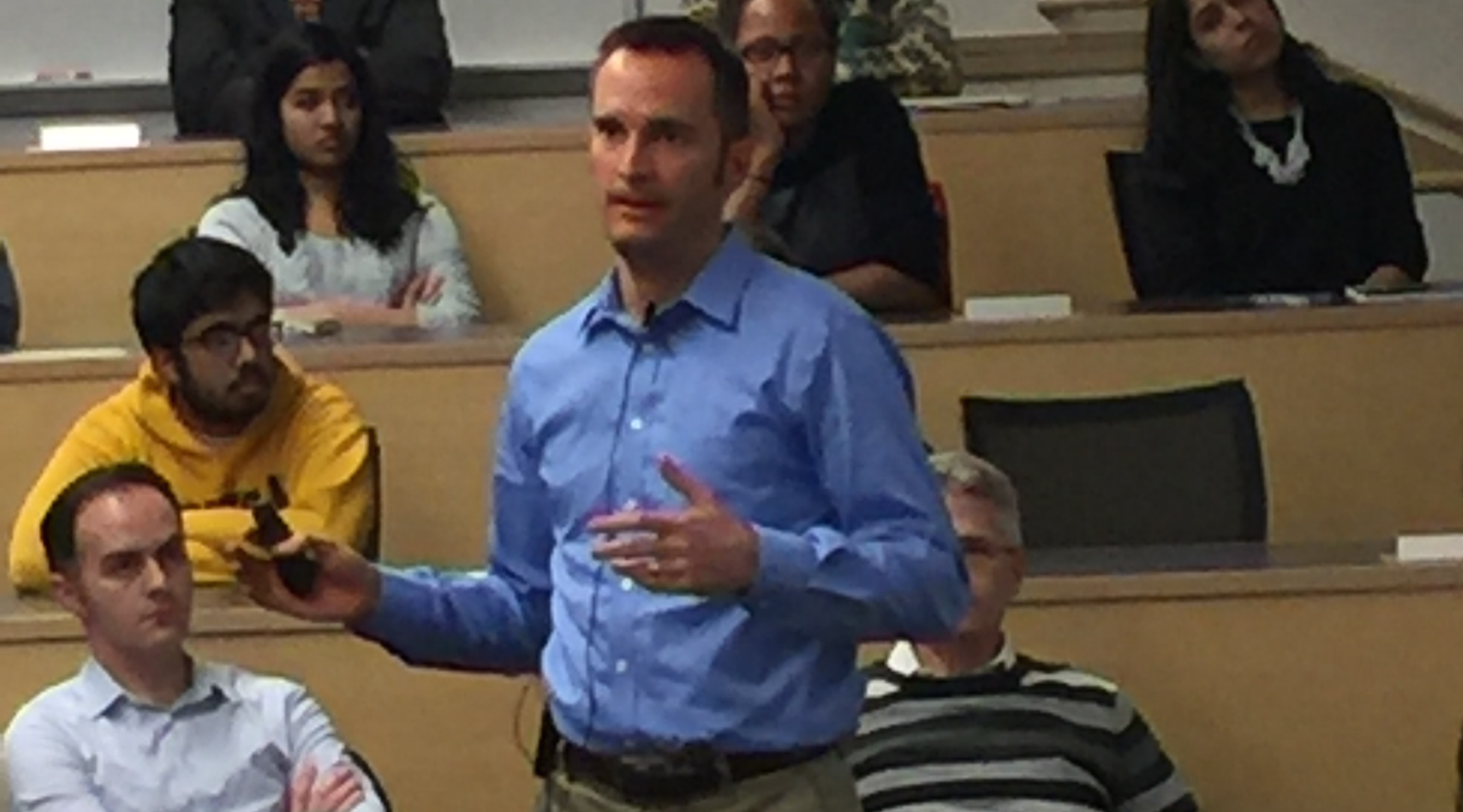
Madison Ayer, executive chairman of Honey Care Africa and co-founder and chairman of Farm Shop, talked about the unique challenges – including poor infrastructure, security concerns, informal regulations, and high costs – of integrating low-income producers and consumers into the supply chain. But, Ayer says, overcoming these barriers can lead to long-term competitive advantage and positive economic impact on communities across the supply chain.
Watch Ayer’s presentation here. Watch Ayer be interviewed by WDI Senior Research Fellow Ted London here.
“Madison is a successful entrepreneur who has turned his focus to base of the pyramid (BoP) markets,” London said. “He launched and subsequently exited two successful IT ventures in the U.S. In BoP markets, he helped turn around Honey Care, and then founded and led the development and growth of Farm Shop.”
Honey Care Africa supplies smallholder farmers with beehives and harvest management services. In addition, it guarantees a market for the beekeeper’s honey at fair trade prices, providing a steady, consistent source of income.
Farm Shop is a social enterprise that serves smallholder farmers across Africa. Farm Shop recruits and trains franchisees that then independently operate community-level agro-dealer shops that supply farmers with all they need to improve production, including seeds, fertilizers, tools and veterinary medicines.
WDI researchers have studied the two ventures in the past. As part of a project, funded by the German development agency GIZ, WDI studied the current landscape of BoP facilitators in the sub-Saharan Africa region. As part of this research, WDI’s Scaling Impact initiative conducted field visits to Ethiopia and Kenya – including the two ventures run by Ayer.
WDI’s Performance Measurement team also conducted a qualitative impact assessment in 2012 to identify the impact of Honey Care Africa on alleviating poverty on children age eight years and younger and developed a case study as part of the series entitled Focusing on the Next Generation: An Exploration of Enterprise Poverty Impacts on Children. The goal of the series, funded by the Bernard Van Leer Foundation, is to gain a greater understanding of the ways in which businesses in emerging markets impact young children’s lives and the potential to optimize impact on children. WDI also wrote and published a popular teaching case study on Honey Care Africa that examined the business’s transition from obligating farmers to maintain their own hives to providing hive management services. The case also explored ways to enhance this new model, including strategies to reduce side selling.
To watch a one-on-one video discussion with Ayer and London, click here.
Before David Griswold began his Nov. 4 talk that was part of the WDI Global Impact Speaker Series, five words appeared on the screen behind him: “Can questions change the world?”
To watch the 45-minute presentation, click here. To view a one-on-one interview with Griswold and WDI’s Ted London, click here.

Griswold, founder of Sustainable Harvest Coffee, said it was a simple question that changed the course of his career and began his long involvement in the transparent, sustainable coffee business. A Mexican coffee farmer had shown up at Griswold’s office in Mexico City. Griswold was a volunteer for the National Coordinating Body for Coffee Farmer Cooperatives and the farmer said he and others from his region couldn’t sell their coffee.
“Can you help us?” the farmer asked.
That question “gave me my answer for what I would do for the rest of my life,” Griswold said.
This is the second time Griswold has been a featured guest of WDI’s speaker series. He also spoke in 2013. In addition to his talk, Griswold also was a guest lecturer for an MBA class at U-M’s Ross School of Business taught by WDI Senior Fellow Ted London on business strategies for the base of the pyramid.
Sustainable Harvest also sponsored a student MBA team from Ross that was organized by WDI. For the project, the student team traveled to Rwanda to conduct an in-depth market analysis of coffee consumption and potential coffee retail channels including hotels, restaurants, and ecotourism. The team then used the market analysis to develop a business plan for the cafe and wholesale operation. Read a feature story about Sustainable Harvest on NextBillion.
Through a series of questions at the forum, Griswold shared his career path and how he grew Sustainable Harvest with the audience made up of U-M students, professors and coffee industry representatives. One of his more difficult times came 18 months ago when he was asked if consumers cared about sustainability.
Griswold didn’t have any hard data, but hoped customers cared about sustainability or else he had spent “the last 25 years of my life building a bridge to nowhere.”
Griswold told the audience he began talking with leaders of companies with the same set of values as Sustainable Harvest to get reassurance that customers did value sustainability And while he doesn’t know for sure whether consumers care about sustainability, his company is taking steps to start gathering relevant data.
He closed his talk by again mentioning the four words – can you help us? – that sent him on his career journey. He asked the audience what they thought the question would be that would change their world.
Some coffee drinkers enjoy cream and sugar with their java. But do they care if sustainability also comes with their morning cup of Joe?

David Griswold, founder of Sustainable Harvest Coffee and the next guest of the WDI Global Impact Speaker Series, will discuss the issue of sustainability at 5 p.m. on Wednesday, Nov. 4 in Room R1210 at the Ross School of Business. The talk is free and open to the public.
Griswold’s talk, “Do Consumers Really Care About Sustainability? Perspectives from Sustainable Harvest Coffee,” will reflect on the growing business challenge of creating authentic and scaled commodity supply chains that are sustainable and can impact the growers and rural communities in the developing world. In times of rapid industry consolidation, venture capital money, and acquisitions in the specialty coffee industry, Griswold wonders if customers really care about sustainability.
Griswold was a guest at WDI in 2013 and sat down then for a video interview with WDI Senior Fellow Ted London. Watch the interview here.
“David has a fascinating story to tell,” London said. “He is an entrepreneur who has built a $50 million business that is primarily focused on sourcing coffee from small holder farmers in developing countries. Sustainable Harvest is a BoP enterprise that is sustainable at scale, which is not an easy feat. But despite all his efforts, David still wonders how much the concept of sustainability really matters to his customers.”
Ted London, vice president and senior research fellow of the Scaling Impact Initiative at the William Davidson Institute, took the stage twice at the international Social Capital Markets (SOCAP) conference, which ran Oct. 6-9 in San Francisco.
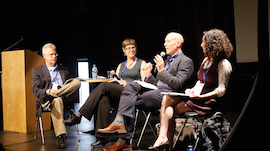
He gave a lecture on SOCAP TV about the Base of the Pyramid promise – generating business value while alleviating poverty – and how delivering on that promise requires the creation of a “partnership ecosystem.” Watch the lecture here.
London continued that theme later in the conference, leading a cross-sector panel discussion about the intersection of impact investing and inclusive business. Watch the panel discussion here.
“We’re all seeking impact at scale,” London said, starting the discussion. “There are a lot of communities and efforts out to do that. And it’s becoming increasingly apparent that there’s a real opportunity to maybe interact more and to cross boundaries more and from an enterprise perspective, to figure out how to build more robust partnerships and partnership ecosystems to make things happen.”
London’s panel represented three distinct segments in that ecosystem:
London summarized that those involved in impact investing and inclusive business should retain their humility as they figure out ways to work together, learning from successes as well as failures: “We have to always think about building the enterprise or the institute of today, but also, how do we build the community of tomorrow?”
The William Davidson Institute has unveiled refocused research initiatives that better reflect the mission of the organization.
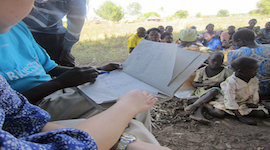
The changes come as the Institute enters its second year under the leadership of President Paul Clyde and as it looks forward to its 25th anniversary in early 2017.
“We spent much of the last year asking how we can more effectively deliver on our mission,” Clyde said. “As a result, we have sharpened the focus of our initiatives to better leverage our experience, our access to the University of Michigan and the skills and talents of our team as we work with companies, institutions and other stakeholders to bring private sector solutions to emerging economies.”
Here is a closer look at the changes.
Initiatives
Each research initiative at WDI is guided by the three components of the Institute’s vision: develop market-based solutions; evaluate and implement solutions through fieldwork; and, share our findings. WDI’s portfolio of initiatives includes:
Education
WDI’s Education Initiative partners with universities and organizations in emerging markets and advances their capacity to deliver world-class management education programs. The initiative takes a two-pronged approach to create and disperse knowledge as part of a global conversation.
First, WDI builds capacity for its partners to deliver superior management training. Some of that capacity building comes in the form of train-the-trainer programs, the deployment of student MBA teams from the Ross School of Business to work on a specific task and a travel-study course at Ross in which graduate students will conduct research in five emerging market countries to incubate new models of management education and implement global best practices with local context.
Second, WDI delivers world-class management education in emerging markets, and is constantly looking for innovative ways – new methodologies, new curriculums and new technologies – to bring to the classroom.
Financial Sector Development
The focus of the new Financial Sector Development Initiative (FSDI) is to identify and implement ways to profitably increase the access to capital in emerging economies. The initiative has two focus areas.
The first looks at how corporate governance and the legal infrastructures in emerging markets are often underdeveloped, making it difficult for firms to access outside financing. One proposed solution is for firms or startup companies to commit to the securities laws and legal rules of a developed country, relying on the legal structures established there to govern transactions.
The second focus is on the effect of remittances on the accessibility of capital. Remittances reflect a transfer of funding as well as information. That information can be used to address moral hazard problems facing lenders. WDI is exploring ways to use some portion of the half trillion dollars in remittances worldwide to lower the cost of capital to those starting or growing businesses in these developing economies.
Healthcare
WDI’s Healthcare Research Initiative has three streams of work that reach across the healthcare value chain to enable well-functioning markets, strengthen supply chain systems, and improve healthcare service delivery.
One stream is shaping the global discussion, along with donors, governments, NGOs and the private sector, on how to design supply chain systems that address the unique challenges that accompany efforts to get lifesaving medicines and supplies to those who need them in the most efficient way. Smooth operating supply chains, the group believes, are a key driver to better health outcomes.
A second stream focuses on market dynamics. The WDI team applies market understanding in order to inform strategies and policies that will lead to more efficient global markets. These more efficient markets will result in improved access and availability of malaria and TB medicines, vaccines and reproductive health products, among other items.
The third stream focuses on healthcare service delivery. The research team works with and studies health care delivery models in the private sector – any aspect from revenue generation and operations to finance and governance – and takes the best practices and applies them in clinics and hospitals in emerging market countries that are working to become financially self sustaining.
Performance Measurement
The Performance Measurement Initiative (PMI) designs and implements customized assessment solutions to understand the economic, social and environmental performance and outcomes of organizations including businesses operating in emerging economies. The purpose is to inform the organization’s decision-making in order to improve their effectiveness, scalability and sustainability. The PMI team’s work contributes to a larger body of knowledge and is shared with the broader community with the goal of increasing application of their findings and lessons by practitioners and managers.
Also, the PMI team engages with experts across different disciplines at the University of Michigan who have developed unique tools and frameworks and works with them to apply these in new settings. The team provides training opportunities and organizes webinars on assessment best practices.
Scaling Impact
The Scaling Impact Initiative focuses on accelerating the development of sustainable and scalable enterprises that generate a net positive impact for the base of the pyramid (BoP). To date, hundreds of enterprises developed for BoP markets have been launched with good support from the right organizations. But few have achieved scale.
In order to enhance its understanding of enterprise success and then translate that knowledge into actionable recommendations, strategies, and frameworks, the Scaling Impact initiative partners with enterprise leaders, development professionals, public policy experts, academics and other stakeholders.